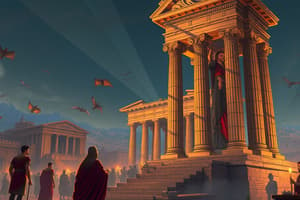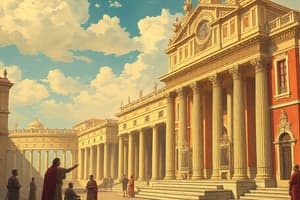Podcast
Questions and Answers
Which statement accurately describes the fate of the Western Roman Empire?
Which statement accurately describes the fate of the Western Roman Empire?
- It was absorbed into the Eastern Roman Empire.
- It transformed into the Byzantine Empire.
- It continued to thrive until the 14th century.
- It collapsed in 476 CE. (correct)
What aspect of Roman culture primarily influenced modern Western civilization?
What aspect of Roman culture primarily influenced modern Western civilization?
- Roman law and architecture (correct)
- Roman military tactics
- Roman agricultural practices
- Roman textile manufacturing
Which of the following was NOT a reason for the decline of the Western Roman Empire?
Which of the following was NOT a reason for the decline of the Western Roman Empire?
- Military overexpansion
- Single identifiable cause (correct)
- Economic troubles
- Political corruption
How did Roman engineering and infrastructure influence modern governance?
How did Roman engineering and infrastructure influence modern governance?
What was one significant aspect of the impact of the Roman Empire on language?
What was one significant aspect of the impact of the Roman Empire on language?
What was the primary form of government in early Rome before the establishment of the Republic?
What was the primary form of government in early Rome before the establishment of the Republic?
Which social class in early Rome was composed of the wealthy elite?
Which social class in early Rome was composed of the wealthy elite?
What marked the transition from the Roman Republic to the Roman Empire?
What marked the transition from the Roman Republic to the Roman Empire?
What was a major consequence of the Roman Republic's expansion during military campaigns?
What was a major consequence of the Roman Republic's expansion during military campaigns?
What period is known as the Pax Romana?
What period is known as the Pax Romana?
What was one of the major internal challenges faced by the Roman Republic?
What was one of the major internal challenges faced by the Roman Republic?
Which of the following was NOT a factor contributing to the decline of the Roman Empire?
Which of the following was NOT a factor contributing to the decline of the Roman Empire?
What was one of the notable achievements of the Roman Empire during its height?
What was one of the notable achievements of the Roman Empire during its height?
Flashcards
Division of The Roman Empire
Division of The Roman Empire
The Roman Empire was divided into Western and Eastern halves, with the Western half collapsing in 476 CE.
Roman Culture's Influence
Roman Culture's Influence
Roman culture dramatically influenced the development of Western civilization, leaving a lasting legacy on art, law, architecture, and religious practices.
Roman Law and Architecture
Roman Law and Architecture
Roman law and architecture significantly impacted later cultures, influencing legal systems and building styles for generations.
Fall of the Western Roman Empire
Fall of the Western Roman Empire
Signup and view all the flashcards
Roman Legacy on Governance and Infrastructure
Roman Legacy on Governance and Infrastructure
Signup and view all the flashcards
Pax Romana
Pax Romana
Signup and view all the flashcards
Patricians
Patricians
Signup and view all the flashcards
Plebeians
Plebeians
Signup and view all the flashcards
Punic Wars
Punic Wars
Signup and view all the flashcards
Augustus
Augustus
Signup and view all the flashcards
Roman Republic to Empire
Roman Republic to Empire
Signup and view all the flashcards
Elected Officials in the Roman Republic
Elected Officials in the Roman Republic
Signup and view all the flashcards
Roman Legal and Administrative Systems
Roman Legal and Administrative Systems
Signup and view all the flashcards
Study Notes
Founding and Early History
- Rome was founded, according to legend, in 753 BCE by Romulus and Remus.
- Early Rome was a monarchy ruled by kings.
- The monarchy was eventually overthrown, and a republic was established.
- The early Roman Republic was characterized by conflict between patricians (the wealthy elite) and plebeians (the common people).
- This period saw the development of key Roman institutions like the Senate and the Assemblies.
- Early Romans established their military. Rome's military success was critical to its expansion.
Republic
- The Roman Republic's government included elected officials like consuls, praetors, and senators.
- The Roman Republic saw a period of significant expansion, conquering much of the Italian peninsula through military campaigns.
- Key events included the Punic Wars against Carthage, which resulted in Rome's dominance in the Mediterranean.
- The Republic faced internal strife, including political divisions and social unrest, leading to the rise of powerful generals.
- The Republic's expansion resulted in immense wealth for Rome and a diverse population, but also created social tension.
Roman Empire
- The Roman Republic transitioned into the Roman Empire around the 1st century BCE.
- The transition was marked by the rise of Julius Caesar, who became a dictator.
- Caesar's assassination led to a period of civil wars, culminating in the rise of Augustus as the first Roman emperor.
- The Roman Empire was a vast empire encompassing much of Europe, North Africa, and the Middle East.
- The empire was centralized under a single emperor. The Roman legal and administrative systems expanded.
- The Roman Empire's military maintained order and facilitated trade.
- Remarkable public works, such as roads, aqueducts, and buildings, were created.
Empire's Golden Age
- The Pax Romana, a period of relative peace and prosperity, spanned significant years of the early Empire.
- The empire's infrastructure and administration flourished.
- Great figures and notable achievements flourished in the arts, literature, and philosophy.
- The empire saw increasing cultural exchange and amalgamation of ideas.
Decline and Fall
- The Roman Empire experienced gradual decline beginning in the 3rd century CE.
- Factors included economic instability, political corruption, military overextension, and barbarian invasions.
- The empire was divided into Western and Eastern halves, with the Western Roman Empire eventually collapsing in 476 CE.
- The Eastern Roman Empire, also known as the Byzantine Empire, continued for another thousand years.
- The decline of the Western Roman Empire was a complex process with no single cause.
Culture and Society
- Roman culture strongly influenced later Western civilization.
- Roman law and architecture had profound impacts on subsequent cultures.
- Roman religious beliefs and practices played a significant role in shaping Roman society.
- Roman art, literature, and architecture were highly developed and influential.
- Public works and large-scale projects were central to Roman life, reflecting their organizational skills.
Legacy
- Roman law, language, administration, and engineering are found in many Western countries to this day.
- Roman legal principles and concepts remain influential in the Western legal tradition.
- Romans developed systems of infrastructure, and their ideas about governance profoundly impacted modern systems.
- The idea of citizenship was developed further and had an impact on Western civilization.
- The Roman Empire's impact on language, especially the development of Latin, is undeniable, reflected in many modern languages.
Studying That Suits You
Use AI to generate personalized quizzes and flashcards to suit your learning preferences.




